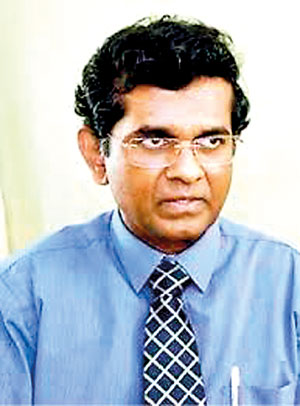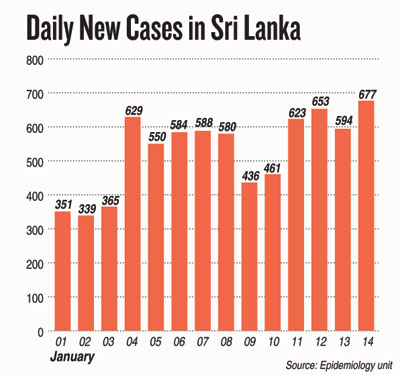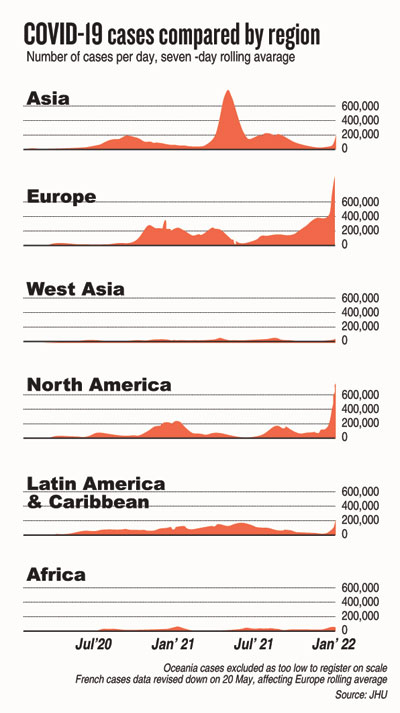News
‘Take all precautions and avoid gatherings’
Dr. Ananda Wijewickrama calls for more surveillance to get a heads-up on infection trend
There seems to be an increasing trend in COVID-19 infections and we need to strengthen surveillance for Severe Acute Respiratory Infections (SARI) and Influenza-like Illness (ILI), urged a top doctor on Thursday.
Looking back at the recent past of what occurred both in neighbour India and also Sri Lanka, Senior Consultant Physician Dr. Ananda Wijewickrama of the National Institute of Infectious Diseases (NIID), Angoda, said that the Delta ‘variant of concern’ was first reported in India in November 2020.

Dr. Ananda Wijewickrama
However, its rapid spread across India occurred in late January 2021 (last year) after a big religious ceremony where lakhs of people participated making it a super-spreader event. They also had two Test matches which were open to the public, he said, pointing out that in Sri Lanka, the spread of the virus began with a vengeance after April.
Dr. Wijewickrama said that to keep the virus at bay, Sri Lanka has to ensure that there is “good” vaccination coverage for the people which, in turn, will protect them against severe disease.
“However, what needs to be underscored is that now the effect of vaccinations is waning and as such the booster is of paramount importance. This is while there is strict adherence to preventive measures such as wearing face masks properly; constant hand-washing when out of one’s home; and most importantly scrupulously avoiding gatherings,” he said.
Unfortunately, he said, what we see is a lot of people attending various events, public and social, which can easily be avoided. These gatherings could be a start point for the spread of the virus.
The importance of testing
When asked about testing, Dr. Wijewickrama reiterated that there is a need to ramp up testing because we know that the Omicron variant of concern is in Sri Lanka.
He said: “Even though the numbers do not seem to be a lot right now, there seems to be an increasing trend in the infections. Therefore, it is crucial to get a heads-up on what is happening in the country through testing – particularly SARI and ILI. This surveillance is vital and should be streamlined. This is how we can get an early warning on what is happening at ground level, so that we are ready for any eventuality.”
When asked whether only those who die of COVID pneumonia are grouped under ‘COVID deaths’, he said that it is not so.
Citing a case where a COVID-19 infected warded at the NIID died of renal failure this week, Dr. Wijewickrama said that it is considered a COVID death because the complication of renal failure had been precipitated by COVID-19.
With concerns that people who have recovered from COVID-19 could face major issues, he said that patients who have had severe disease and complications – those who have been oxygen-dependent, have had COVID pneumonia and/or have been in the Intensive Care Unit (ICU) – should be careful after they are discharged from hospital.
When they go home, they need to take adequate rest, take their medications if any have been prescribed at the right time for the full duration and also take proper nutrition. If they experience fever or breathing difficulties, they need to go back to hospital immediately, he said.
To the others, his advice was that they will not have long-term complications but may experience muscle pain, a loss of smell and taste or other mild symptoms for a few weeks which would go away.
Vaccination hesitancy
Referring to myths and misinformation surrounding vaccination, he said that all people eligible for the vaccine against COVID-19 should get the first two jabs and also the booster without fail.
He pointed out that he has done so and all his family and friends have also taken the vaccinations and the booster.
Dr. Wijewickrama was the first person in Sri Lanka to be symbolically administered the first dose of AstraZeneca way back in January 2021.
When people talk of paralysis, heart attacks and even delayed menstruation, these conditions can happen either naturally or due to some other thing and are not related to the vaccine, he said, adding that people should take into account the fact that the vaccines against COVID-19 have been given to millions of people across the world. If such conditions were occurring, there would be a wave of illness and death. Nothing of the sort has happened.
He went on to explain that if somebody has uncontrolled hypertension, diabetes or other non-communicable diseases (NCDs), they could suffer a stroke or a heart attack because of this. Sometimes, it could happen a week or two after vaccination and they would erroneously link it to the vaccination.
He advised all those eligible to take the vaccine without fail and without delay, reminding people that “we have been taking the tetanus toxoid vaccine a few times throughout our lives”. This is why it is surprising that some are reluctant to get the booster against COVID-19.
Concerns over schoolchildren getting infected
“When schools open, the virus may spread within them but it is impossible to keep schools closed forever,” he said, assuring that children are very unlikely to get any complications due to COVID-19.
However, Dr. Wijewickrama pointed out that the problem is that these children can bring the virus home. This is why all adults at home who are eligible for the vaccine should be vaccinated. Then even if they get the infection from the children, they are unlikely to get severe disease, complications or die.
“Reports from across the world indicate that the spread from schools is much less compared to other places, maybe because schools have large open spaces with proper ventilation. It could also be that children are less likely to get infected,” he added. 

| The importance of surveillance Throughout the pandemic, the Sunday Times quoting experts, has emphasized the need to strengthen data collection at least in hospitals, as the reported cases of COVID-19 could be under-estimated due to limited testing capacity. Suspected cases and patients with symptoms who walk in to the Outpatients Departments (OPDs) should be tested for SARS-COV-2, according to experts, as Influenza-like Illness (ILI) and Severe Acute Respiratory Infection (SARI) surveillance data available separately from more than 50 sites can complement and provide a handle on the community burden. These experts have reiterated that diligent surveillance would also send out prompt red alerts about more virulent COVID-19 variants which could set off a huge wave of infections. Currently, the daily RT-PCR testing numbers average around 7,500, while Rapid Antigen Tests (RATs) average around 3,500. Sri Lanka reports around 500-650 COVID-19 cases a day and between 11-16 deaths per day. | |
The best way to say that you found the home of your dreams is by finding it on Hitad.lk. We have listings for apartments for sale or rent in Sri Lanka, no matter what locale you're looking for! Whether you live in Colombo, Galle, Kandy, Matara, Jaffna and more - we've got them all!

